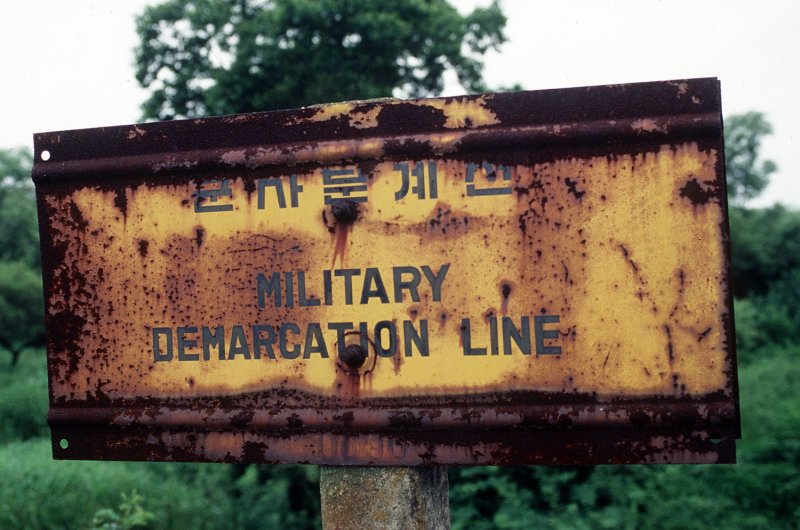This undated Department of Defense photo shows a sign in the Demarcation Line (MDL) separating North and South Korea. On Monday, May 25, 2009 North Korea allegedly detonated a nuclear device during an underground test and test fired several short range missile. North Korea announced that it has restarted its nuclear weapons research program. (UPI Photo/Scott Stewart/USAF) |
License Photo
PYONGYANG, North Korea, April 12 (UPI) -- North Korea's failed long-range rocket launch Friday was condemned by the Group of Eight nations' foreign ministers.
The G8 -- Britain, Canada, France, Germany, Italy, Japan, the United States and Russia -- said firing the rocket, which broke into pieces before reaching space, was a violation of U.N. Security Council Resolutions 1695, 1718, and 1874.
"Sharing the view that the launch undermines regional peace and stability, we call on the DPRK [Democratic People's Republic of Korea] to abstain from further launches using ballistic missile technology or other actions which aggravate the situation on the Korean Peninsula," the ministers' joint statement said. "We are ready to consider, with others, taking measures responding to all activities of the DPRK that violate U.N. Security Council resolutions, and calling for appropriate response by the United Nations Security Council.
"We urge the DPRK to meet its international commitments, including those under the 2005 Joint Statement of the Six-Party Talks; comply with its obligations under all relevant U.N. Security Council resolutions, in particular by abandoning all its nuclear weapons and its existing nuclear and ballistic missile programs in a complete, verifiable, and irreversible manner; cease its uranium enrichment activities, which violate U.N. Security Council Resolutions 1718 and 1874; and take concrete and irreversible steps toward denuclearization."
The Los Angeles Times reported U.S. officials said the rocket broke apart shortly after launch. The officials said its trajectory was southward on a course 150 miles east of Shanghai. They said the second stage was expected to splash down east of the Philippines.
CNN reported a U.S. official, using data collected by the United States, concluded no part of the rocket reached space.
"This was supposed to be associated with [Kim Jong Un's] ascension to power. So for this thing to fail ... is incredibly embarrassing," Victor Cha, former director of Asian affairs for the U.S. National Security Council who is now a Georgetown University professor, told CNN.
The launch of the Unha-3 rocket, which violated several U.N. resolutions, came on the second day of a five-day window of opportunity. The North said the rocket's only mission was carry a satellite into space, but the South, the United States and others worried it was a cover to develop an intercontinental ballistic missile capable of carrying a nuclear warhead.
The rocket's failure didn't lessen U.S. concerns about the North's thumbing its nose at the international community, a White House spokesman said in a statement.
"Despite the failure of its attempted missile launch, North Korea's provocative action threatens regional security, violates international law and contravenes its own recent commitments," the statement issued by the office of White House press secretary Jay Carney said. "While this action is not surprising given North Korea's pattern of aggressive behavior, any missile activity by North Korea is of concern to the international community. The United States remains vigilant in the face of North Korean provocations, and is fully committed to the security our allies in the region.
"The president has been clear that he is prepared to engage constructively with North Korea. However, he has also insisted that North Korea live up to its own commitments, adhere to its international obligations and deal peacefully with its neighbors.
"North Korea is only further isolating itself by engaging in provocative acts, and is wasting its money on weapons and propaganda displays while the North Korean people go hungry. North Korea's long-standing development of missiles and pursuit of nuclear weapons have not brought it security -- and never will. North Korea will only show strength and find security by abiding by international law, living up to its obligations, and by working to feed its citizens, to educate its children, and to win the trust of its neighbors."
The statement made no mention of the United States' previous threat to rescind a food aid agreement announced six weeks ago.
The United States won't seek more U.N. Security Council sanctions because North Korea already is heavily sanctioned and the United States must preserve its political standing with China and Russia to secure their backing for any future U.N. measures against Syria and Iran, a senior official told The New York Times. More likely, the source said, would be a statement from the U.N. Security Council president.
Administration officials said they were concerned the launch could be the first in a series of provocations that may include testing of a nuclear bomb possibly fueled by highly enriched uranium.
"North Korea should stop engaging in these types of provocative and destabilizing actions," Tommy Vietor, a spokesman for the National Security Council, told the Times. "We'd like to see nations that have close relations with North Korea consider what else they could do to send a clear signal to this new leadership that it's time for them to move in a different direction."















